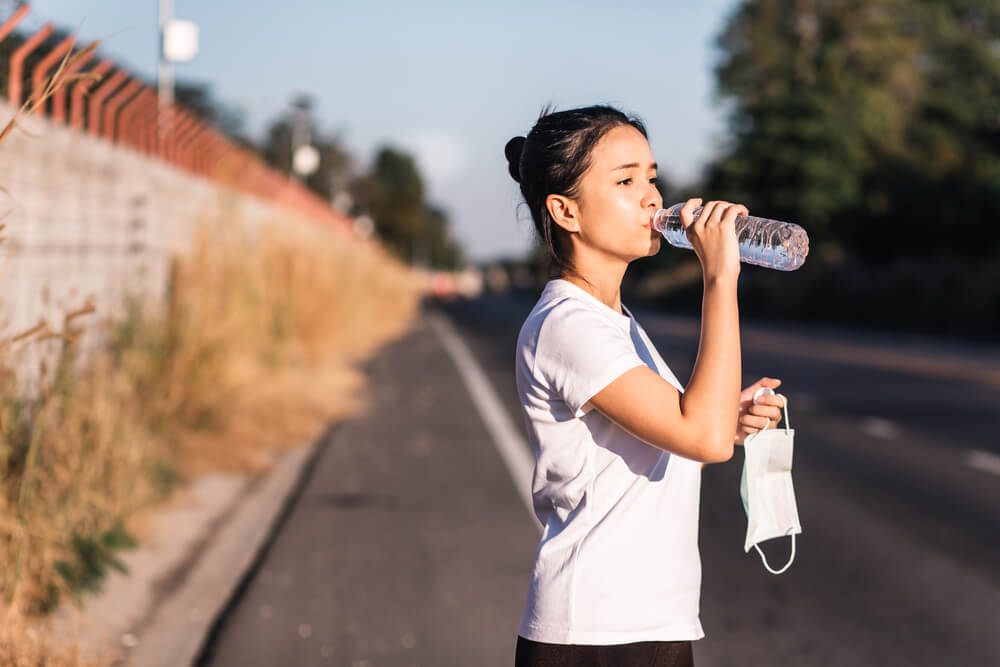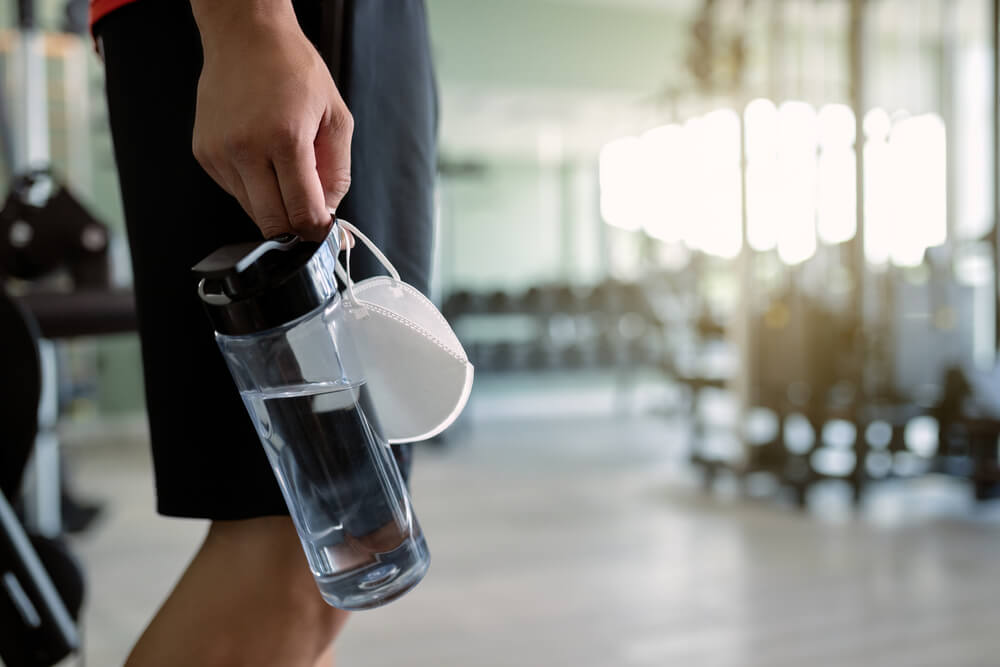This article will cover several questions and concerns you may have about the novel coronavirus (SARS-CoV-2) and drinking tap water.
How safe is my water supply during the COVID-19 pandemic? Can coronavirus spread through tap water? How can I protect my drinking water from COVID? Do I need a water filter to keep off coronavirus?
Read on for answers to these questions and more on how to stay cautious and safeguard yourself from getting infected by the coronavirus.
First things first, can I catch coronavirus from drinking tap water?
Here’s the short answer: NO, you cannot get coronavirus from tap water. The World Health Organization (WHO), Environmental Protection Agency (EPA), and Centers for Disease Control and Prevention (CDC) have all demonstrated that it’s safe to consume treated drinking water.
Let’s make one thing clear right from the outset: there’s a lot of grey area when it comes to the novel coronavirus even more than a year down the pandemic. Scientists and clinicians are finding out new things and fascinating facts about the nature of the virus and how it spreads. Some guidelines may change or get reviewed as new facts and reliable information become available.
Let’s not forget that more and more new variants are making headlines almost every day, so we must take every precaution to protect ourselves as the vaccination continues to help slow down the pandemic.
Now to the question at hand, can coronavirus spread through drinking tap water?
According to the CDC, the presence of SARS-CoV-2 – the novel coronavirus that causes COVID-19 – hasn’t been detected in treated drinking water supplies. More than that, over 300 water utility companies in the United States have confirmed to their customers that their tap water supply is safe to use and drink.
On its end, the WHO has shared on its Mythbusters webpage that the coronavirus doesn’t spread through water. That means you can catch the COVID-19 virus from either drinking water, using it for cooking, or swimming in it. However, the global health-focused organization was quick to mention that coronavirus has been found to spread between people when they are in close contact with an infected person.
How’s tap water safe from the coronavirus?
Many credible institutions have already established that the COVID-19 virus has not been detected in most American water supplies. The reason behind this is that water utility companies use disinfectants like chlorine and filters to eliminate germs, including the COVID-19 virus.
To recap: there’s no evidence as of writing that the COVID-19 virus can be passed to a person when they take treated drinking water. As is already common knowledge, the virus is transmitted primarily through person-to-person close contact. So, don’t be afraid to drink tap water or use it normally.
The good news is that most people also use water filtration systems. The vast majority of water filling stations use advanced filters to not only improve the taste but also get rid of any persistent germs, so you can rest assured that you’re drinking safe, clean water.
Can I catch coronavirus from drinking bottled water?

This one is a little tricky because it depends on a series of factors and scenarios. Yes, the COVID-19 virus has not been detected in treated water, which is one of the processes bottled water goes through.
The WHO has also made it clear that there’s no current evidence about the coronavirus surviving in drinking water, bottled or not.
As with public drinking water, bottled water in the US must meet stringent safety standards for more than 90 contaminants as dictated by the Safe Drinking Water Act. According to PennState University, one main contaminant category required under the act covers pathogens such as Giardia, Cryptosporidium, E. Coli, coliform bacteria, and viruses, including the one that causes COVID-19.
Accordingly, water bottlers treat drinking water using disinfection and filtration. The US Food and Drug Administration (FDA) also has a set of extra requirements that bottled water must meet before being sold for human consumption.
It’s also imperative to remember that the coronavirus may be spread if you share bottled water with an infected person. If the bottle has been touched by someone who is shedding the virus, it may be transmitted to you.
All in all, it’s safer to use and drink tap water over bottled water. Besides, there’s no tangible evidence that bottled water is safer, healthier, or even tastier than drinking tap water, not to forget that there are numerous reasons why plastic bottled water is bad for you, the environment, and more.
Are there any general tips to avoid spreading, catching, or getting sick from the coronavirus?
By now, you have gotten the basics of protecting yourself and others from COVID-19 down. These include:
– Wear your mask
As recommended by the CDC, you must always wear your mask when you go outside of your home. Several sources have shown the mask play a role in preventing the spread of the novel coronavirus from person to person.
– Avoid large crowds
This is a no-brainer measure as the virus has been found to spread between people who are in close contact (in general, that means less than 6 ft. /1m spacing in between the two parties). So socialize outdoors (and indoors, if possible), meaning that you should maintain at least six feet of distance between you and others.
– Wash your hands regularly
You must clean your hands thoroughly and frequently using soap & water or an alcohol-based sanitizer or rub with 60+ percent alcohol. When using soap and water, you must wash your hands at least 20 seconds, particularly before eating, after visiting the restroom, and after handling anything from outside.
The same is true when you sneeze, cough, or blow your nose. You must wash your hands for more than 20 seconds. Why? Glad you asked – preliminary studies have shown that soapy water or alcohol-based sanitizer helps kill and eliminate viruses (including coronaviruses) that might be on your hands.
– Stay home when feeling sick
If you’re not feeling well, you’d be better off staying at home. Note that if you have difficulty breathing, coughing, and fever, you must get medical attention as soon as possible. To help prevent the spread of the virus, call ahead and follow the instructions provided by your local, state, and federal health authorities.
This is very crucial because local and national authorities are the most up-to-date when it comes to dealing with the virus. When you call ahead, you will allow healthcare providers and state officials to point you to the right healthcare facility, helping minimize the spread of the coronavirus.
– Observe safe and hygienic respiratory practices
Practicing respiratory hygiene can go a long way. This is particularly important when you cough, sneeze or blow your nose. You must cover your nose and mouse with tissue or your elbow when you do so. That’s because tiny droplets containing the virus get into the air when you sneeze or cough if you’re infected. And by covering your nose and mouth, you will protect your loved ones and others around you from the virus.
Is there anything else I can do?
– Eat well
Eating healthily (coupled with an active lifestyle) during the COVID-19 pandemic is crucial for your mental, physical, and emotional wellbeing. Ensure your diet is well-balanced and healthy with a range of different foods. This will make sure that you’ll get all the energy and essential nutrients to power through your everyday activities.
One of the most important nutrients to watch as you social distance and work from home is vitamin D. Because it’s naturally derived from the sun, you may have to supplement to meet your daily recommended intake of 10 micrograms of vitamin D.
Pregnant women, children under 5, and people from ethnic groups with darker skin should also consider taking a supplement or increasing their sun exposure.
What types of foods are healthy? Load up on pulses (like lentils, beans, etc.), veggies, and fruits. They help you feel fuller for longer and are chock full of vitamins, minerals, and other amazing nutrients.
Be smart with your snacking, too. Instead of high-calorie snacks like chips, cookies, and pastries, try chopped veggies, fruits, rice cakes, breadsticks, and crackers.
– Don’t overindulge in alcohol
The worries associated with the COVID-19 pandemic may leave you stressed and bogged down. That’s why you should be alcohol aware as you may find yourself drinking more than usual. Keep your alcohol drinking to the recommended limits of 1 drink or less for women; and two drinks or less for men, according to the Dietary Guidelines for Americans.
– Stay properly hydrated
We all know that drinking enough water is good for your health and wellbeing. Aim for 15.5 cups (3.7 liters) if you’re a man and 11.5 cups (2.7 liters) if you’re a woman. This will help boost your immunity, improve your mood, and ensure great-looking skin.
Note that milk, water, and non-sugary drinks also count as fluids, including coffee and tea. Soda pops, smoothies, fruit juices, and flavored drinks may be high in sugar (empty calories), so limit them to 150 ml daily.
It’s not uncommon for people to confuse hunger with dehydration. Quench your thirst often and you’ll feel fuller for longer. As we’ve mentioned, tap water is safe from COVID, free, and is a cheaper, more eco-friendly choice for staying hydrated.
Tap water has no added sugars, no calories, and generates no waste, unlike bottled water. Having a good water bottle like Kool8 without is a great idea and can encourage you to drink up throughout the day.

